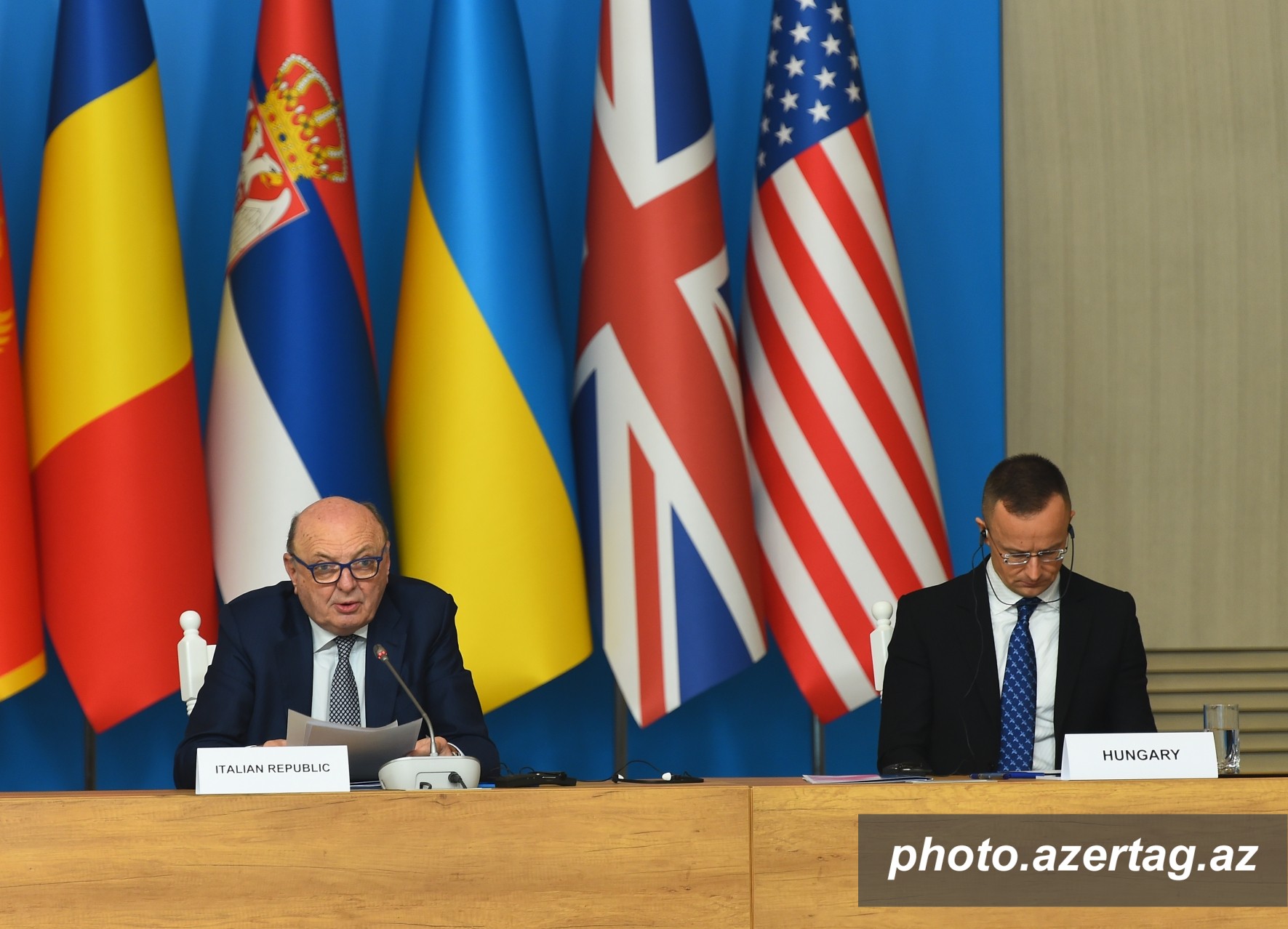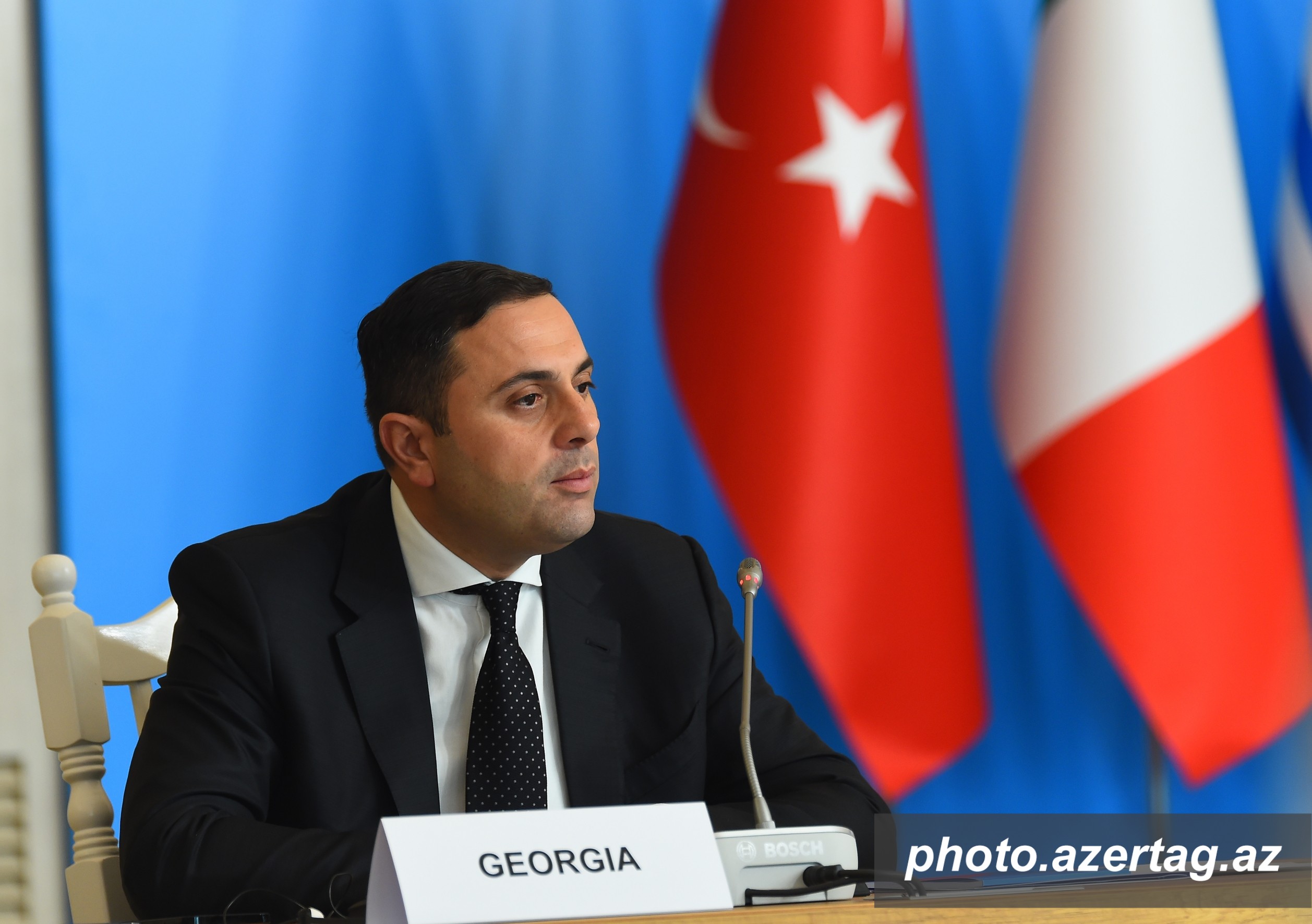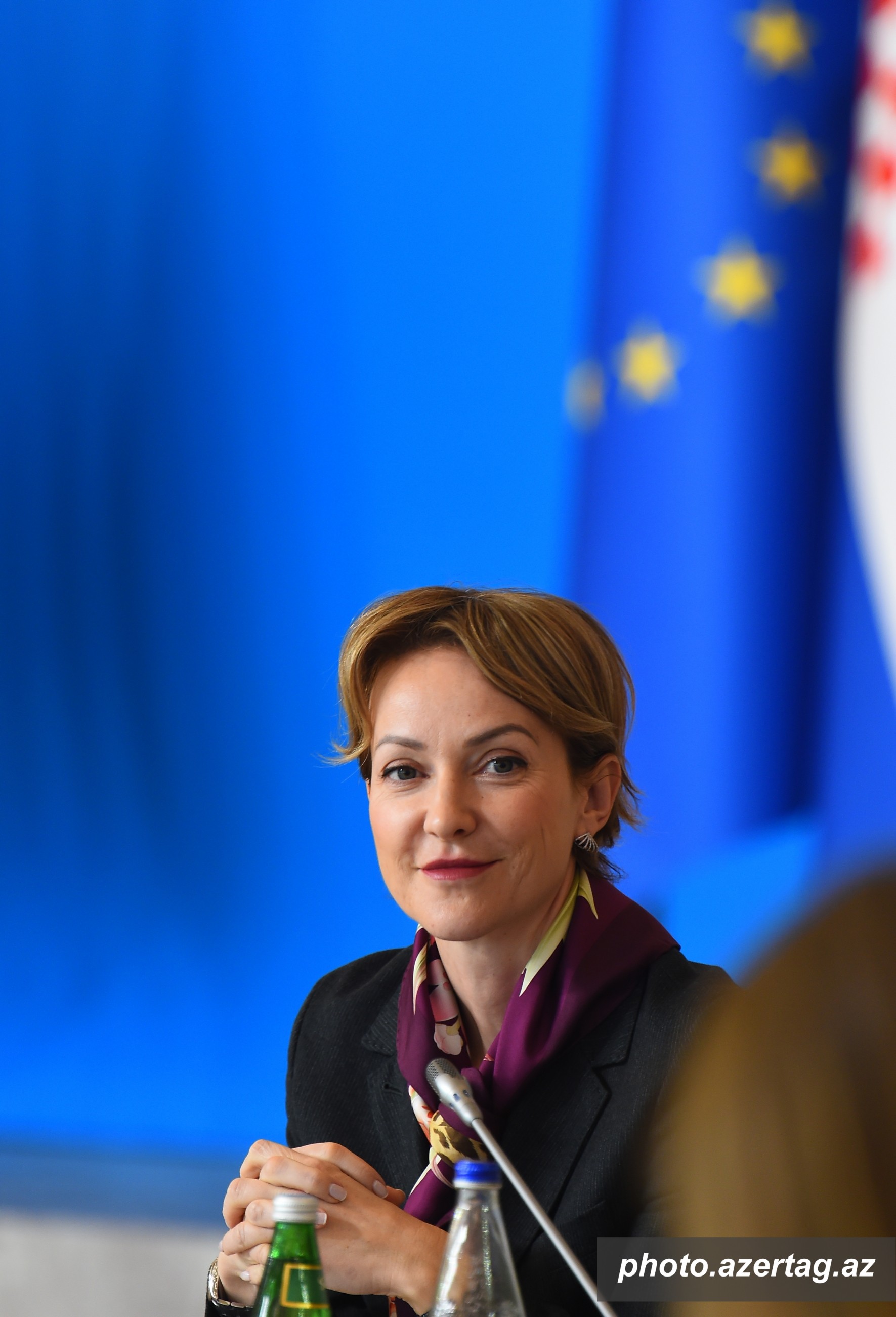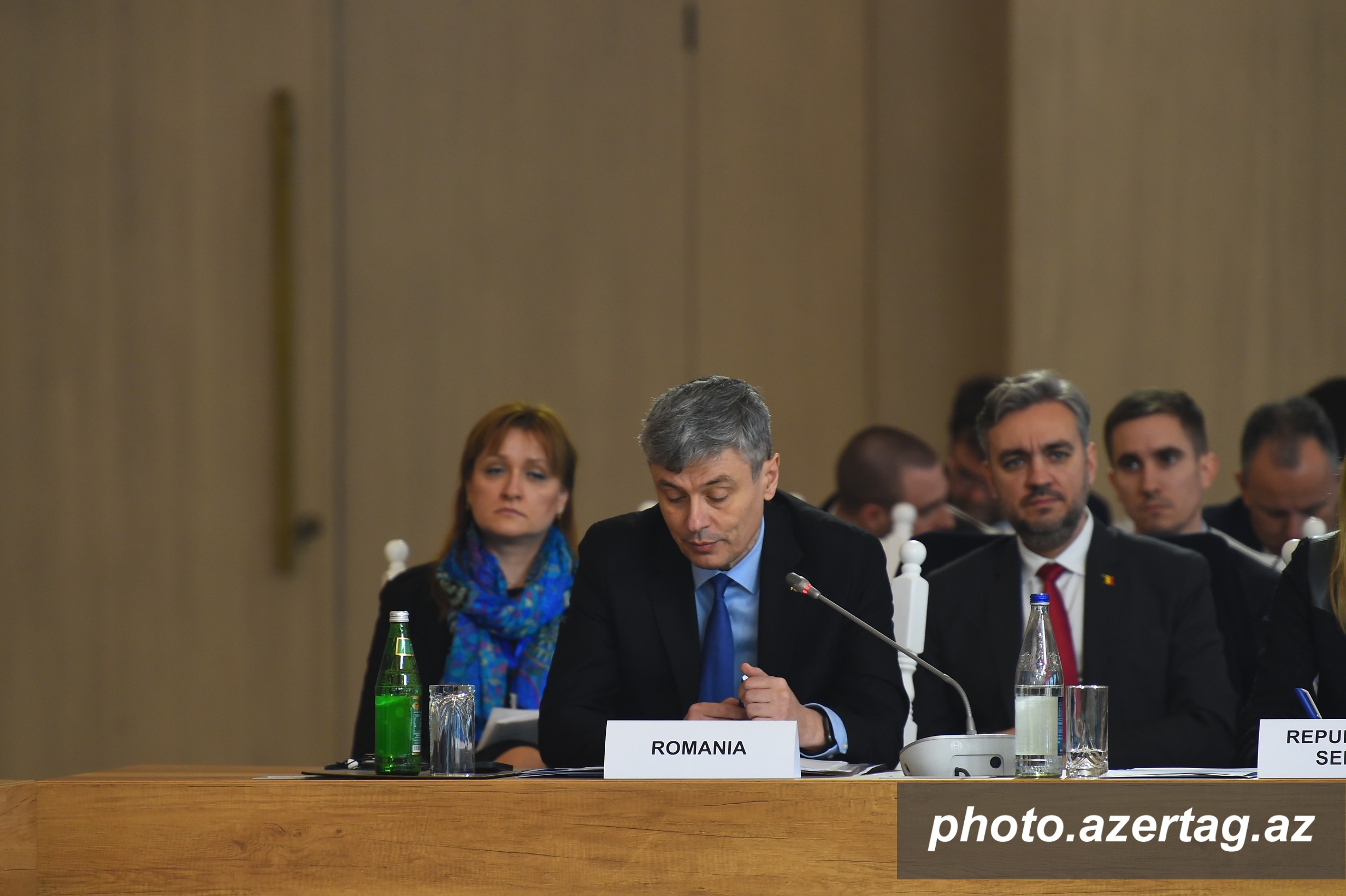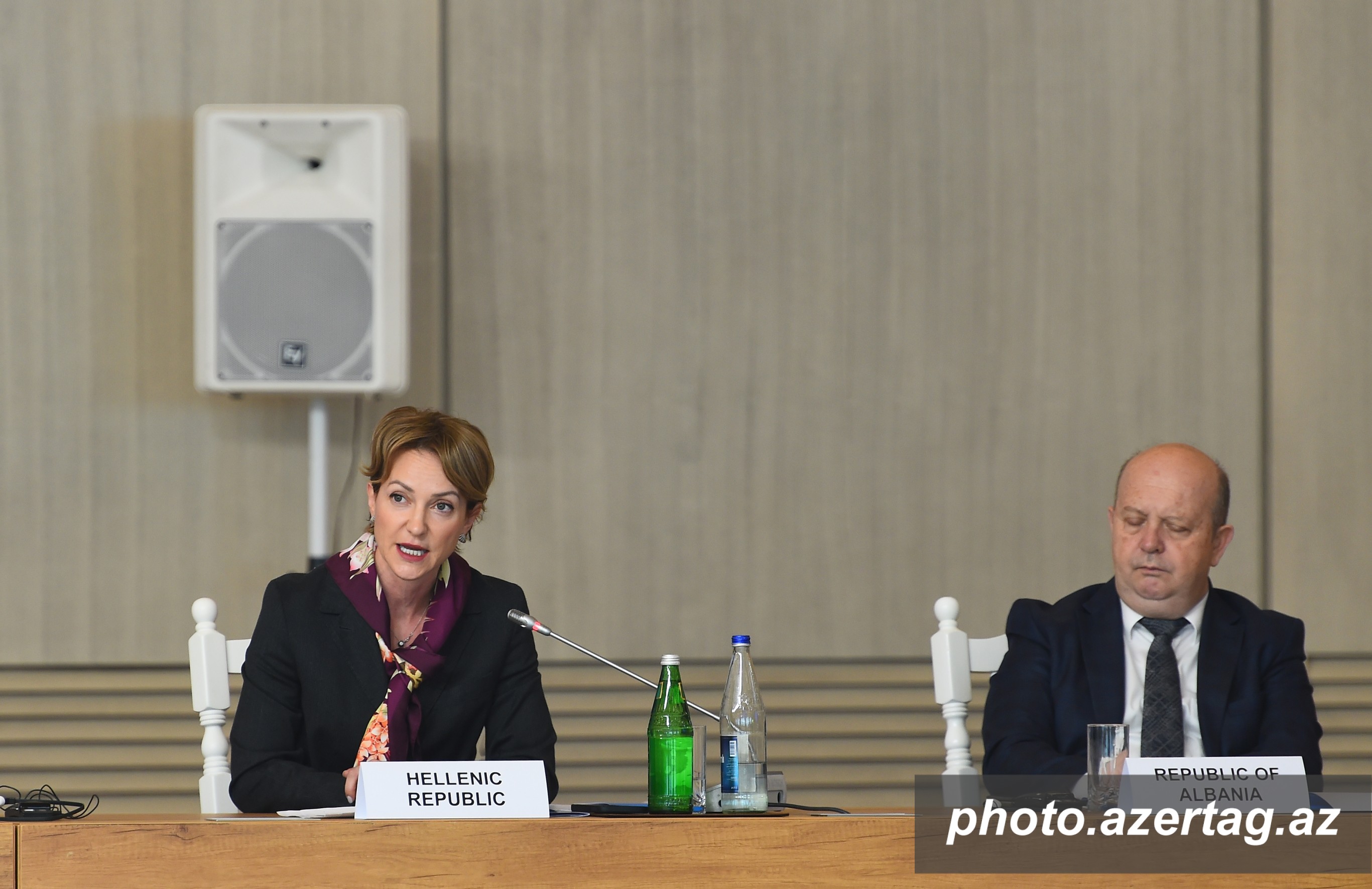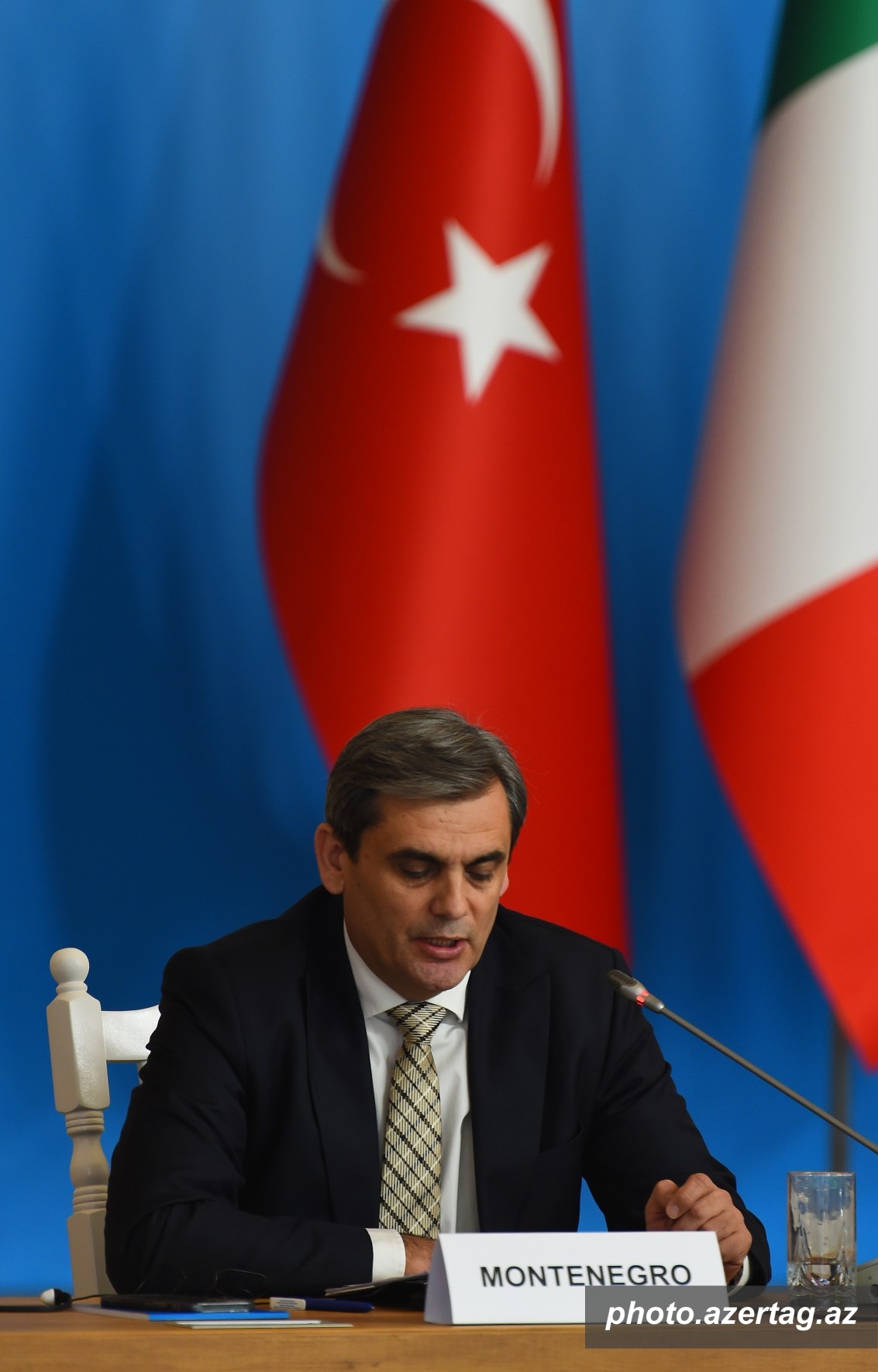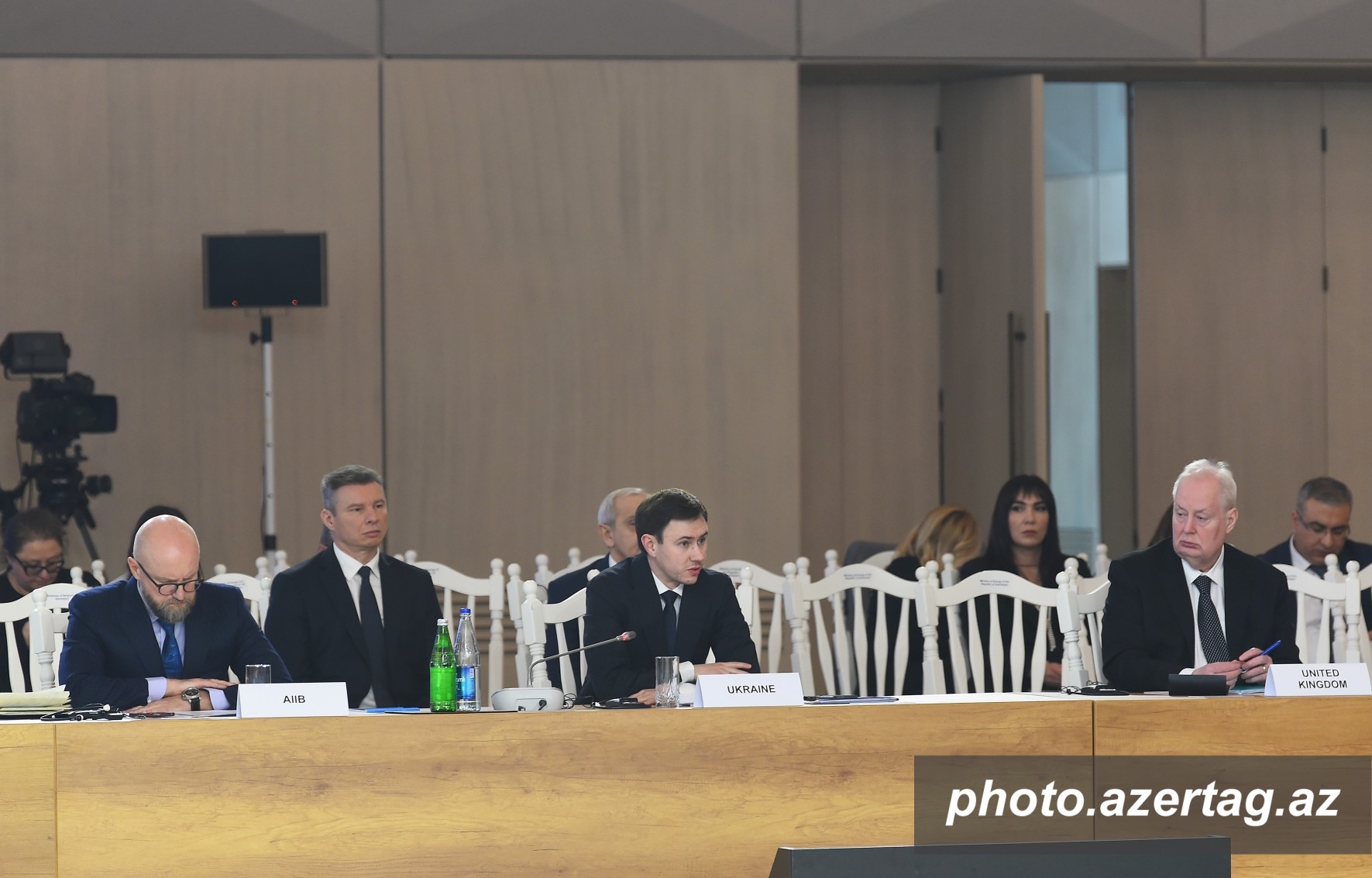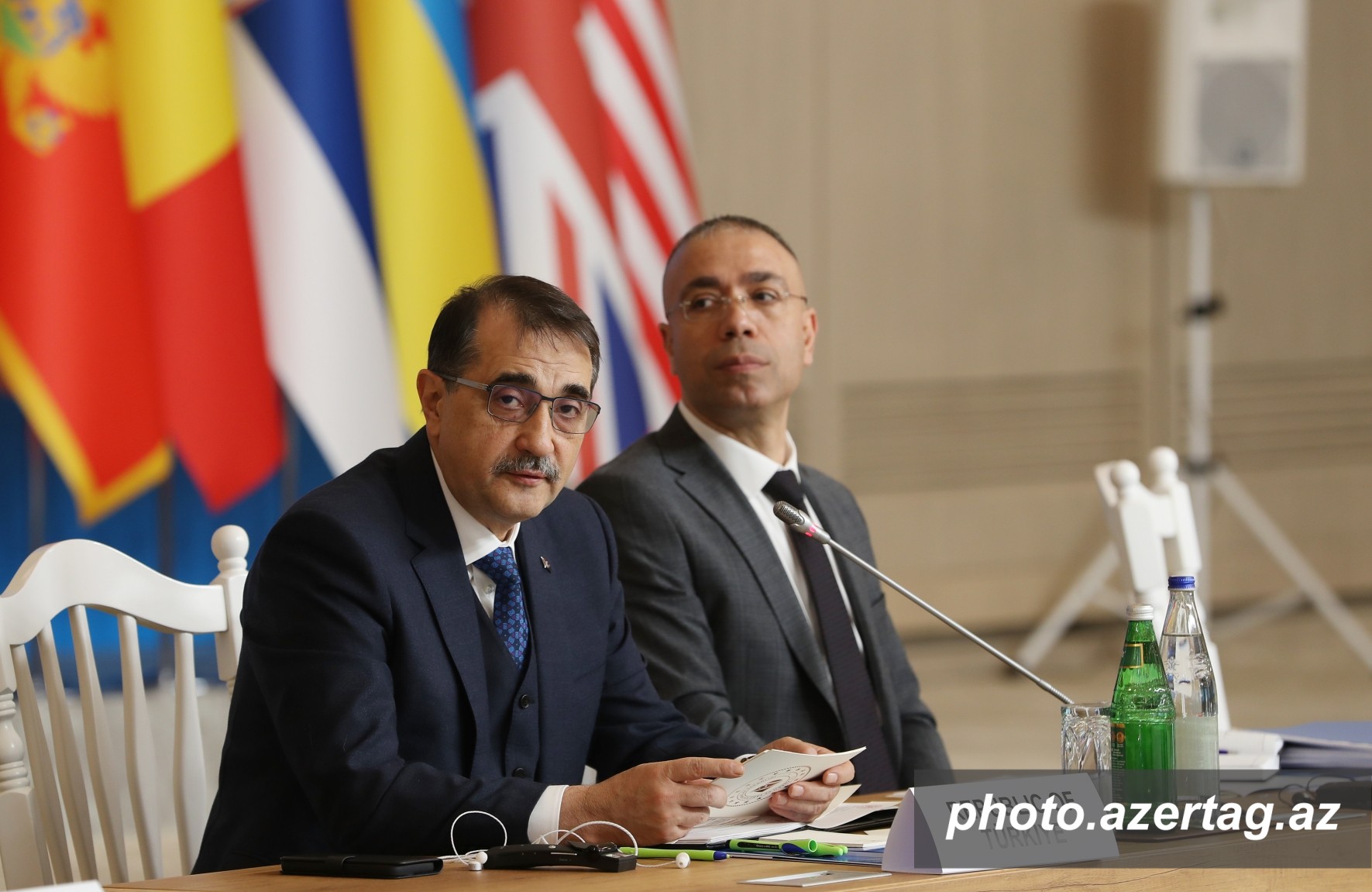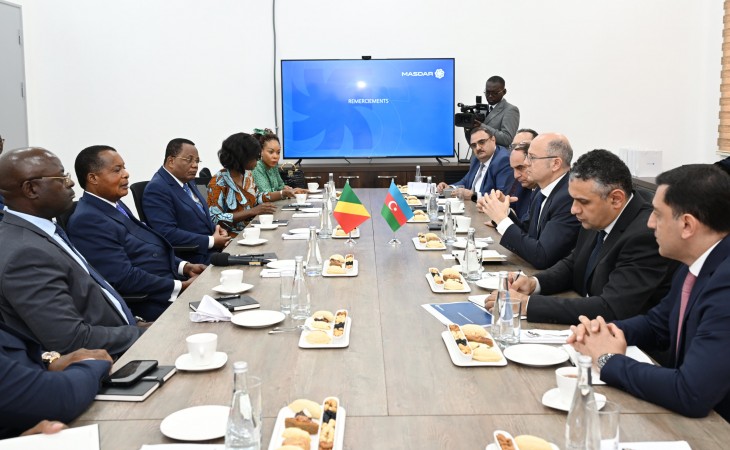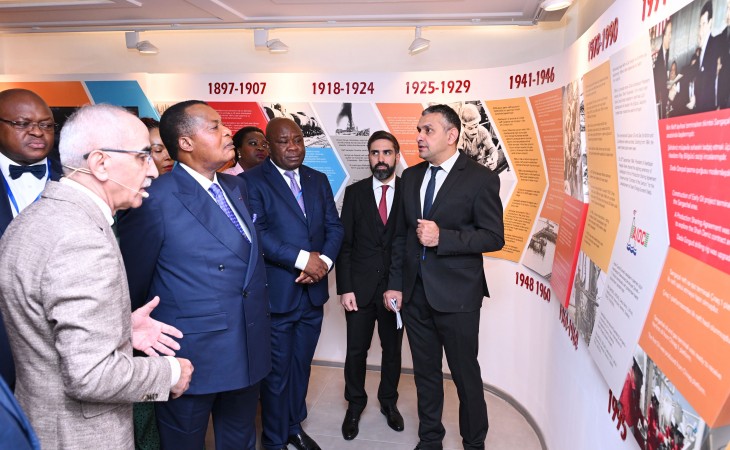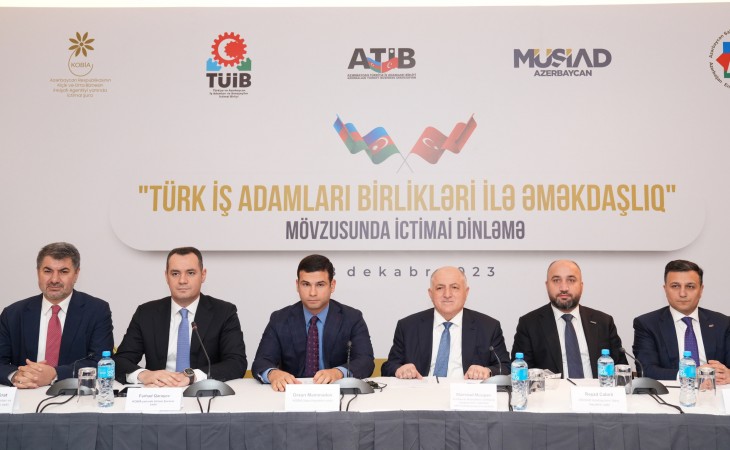Meetings of ministers as part of Southern Gas Corridor Advisory Council and Green Energy Advisory Council continued with plenary sessions
ID:
03.02.2023 17:20 / ECONOMY
Photo : AZERTAG / Roman Ismailov
The 9th Southern Gas Corridor Advisory Council Ministerial Meeting and 1st Green Energy Advisory Council Ministerial Meeting held in Baku on February 3 continued with plenary sessions on the “Southern Gas Corridor and Green Energy Ministerial Session”, “Southern Gas Corridor: Expanding affordable, stable and safe natural gas supply” and “Green Energy: Delivery of Caspian Sea wind energy to European energy markets”.
The 9th Southern Gas Corridor Advisory Council Ministerial Meeting and 1st Green Energy Advisory Council Ministerial Meeting held in Baku on February 3 continued with plenary sessions on the “Southern Gas Corridor and Green Energy Ministerial Session”, “Southern Gas Corridor: Expanding affordable, stable and safe natural gas supply” and “Green Energy: Delivery of Caspian Sea wind energy to European energy markets”.
In his opening remarks at the ministerial session, Azerbaijan's Minister of Energy Parviz Shahbazov confirmed that the launch of the Green Energy Advisory Council along with the Southern Gas Corridor Advisory Council was evidence of the fact that green energy was a priority for the country alongside natural gas. Emphasizing that Azerbaijan was a reliable strategic partner for regional countries and Europe in terms of energy supply, the minister said: “2023 is a crucial year for us both in terms of the Southern Gas Corridor and in terms of the delivery of the green energy from the Caspian Sea to Europe. In 2022, gas supply to Europe through the Southern Gas Corridor was increased to 11.4 billion cubic meters. In order to be able to double gas supply to 20 billion cubic meters by 2027, we need to accelerate our infrastructure and upstream investment decisions, consolidate all stakeholder positions without wasting any time, and begin expanding the corridor through comprehensive diversification. Today, the creation of a green energy corridor powered by Azerbaijan is also our strategic priority. In December last year, with the political support of the European Commission, Azerbaijan, Georgia, Romania and Hungary took a historic step to connect the Caspian Sea to Europe by means of green energy. The route, which claims to become a green energy corridor of the 21st century, may be used to transport 3-4 GW of green energy. Our cooperation with foreign energy companies on energy projects of more than 25 GW allows Azerbaijan the opportunity to become an important and reliable partner supplying green energy and hydrogen for Europe in the near future.”
Turkish Minister of Energy and Natural Resources Fatih Donmez said in his remarks that it was needless to say that TANAP as the main component of the Southern Gas Corridor was a perfect example of joint cooperation. “This corridor shows that a common goal can bring countries together. All these gigantic projects are being efficiently implemented thanks to close cooperation. The realization of this corridor and the flow of commercial gas to Europe is an especially important step towards achieving this goal. Additional reserves and source countries are needed to increase gas volumes. In this context, we are ready to develop cooperation with Azerbaijan and Turkmenistan in order to improve the well-being of our region,” he said.
Italian Minister of the Environment and Energy Security Gilberto Pichetto Fratin said: “The potential of the Caspian region’s energy resources will play an important part in our energy policy in the future. Through new long-term supply contracts, we hope to increase the capacity of the Southern Gas Corridor to increase gas supplies to the European Union to at least 20 billion cubic meters by 2027. We believe that this is an important prospect not only for consumers and transit countries, but also for producer states.”
US Deputy Assistant Secretary for Energy Diplomacy in the Bureau of Energy Resources Laura Lochman noted in her remarks that the US-Azerbaijani partnership would create a foundation for energy security through regional energy cooperation and the transition to clean energy.
British Regional Ambassador for Energy Security and Climate David Moran said: “We are proud of the transformative role bp and other British companies have played in the development of the Southern Gas Corridor and Azerbaijan, and we do hope that cooperation will continue at a time when the foundation of Azerbaijan's green economy is being laid.”
Deputy Minister of Economy and Sustainable Development of Georgia Romeo Mikautadze pointed out that the contribution of the Southern Gas Corridor to the energy security of EU member states and those beyond its borders was of special importance to Europe. He said the Southern Gas Corridor had paved the way for dynamic processes and partnership among countries located along it and beyond. It was noted that Georgia was an active supporter of the Southern Gas Corridor and that the project was very important for this country as it plays the role of an energy bridge.
Minister of Foreign Affairs and Trade of Hungary Péter Szijjártó said: “The importance of Azerbaijan for Europe has increased due to the intense energy crisis. Increasing the volume of natural gas produced in the South Caucasus is the most favorable option for diversification in the short and medium term. Increased production of natural gas in Azerbaijan can play an important role for the energy security of Hungary and Central Europe, but this requires the development of infrastructure with the support of the European Union. We, the Hungarians hope that Azerbaijani gas will contribute to Hungary's energy security as soon as possible.”
Romanian Minister of Energy Virgil-Daniel Popescu said the fact that Romania was represented in Baku at the highest level, by President Klaus Iohannis, as well as the Minister of Energy, was further evidence of the country's support for the plans to expand the Southern Gas Corridor. Currently, the development of gas transportation infrastructure is of great importance for strengthening the energy security of Southeast and Central Europe. Romania is ready to be a reliable partner in this.
Bulgarian Energy Minister Rossen Hristov pointed out in his remarks that global challenges in the energy sector required great effort. The Southern Gas Corridor has become the most efficient way to supply Europe with natural gas under changing geopolitical conditions. Bulgaria and Azerbaijan are partners that ensure Europe's energy security.
Albania's Deputy Minister of Infrastructure and Energy Ilir Bejtja said his country would chair the Energy Union in 2023. “The goals for this year are to prioritize renewable sources in the diversification of energy production, to become a leading energy-saving country by increasing efficiency, and to develop natural gas infrastructure for gas supply to industrial and energy sectors. Albania's goal is to produce environmentally friendly energy.”
“It is more important than ever before to establish closer cooperation in the field of energy. The energy crisis in Moldova and the increase in the price of natural gas in Europe show again the importance of diversifying natural gas supply sources. This gas transportation system, which covers six countries, helps to diversify energy sources even in regions that previously did not have access to natural gas,” said Deputy Prime Minister and Minister of Infrastructure and Regional Development of Moldova Andrei Spînu.
Deputy Prime Minister and Minister of Capital Investments of Montenegro Ervin Ibrahimović said that in accordance with the European Green Energy Agreement and the energy policy of the European Union, his country was committed to the transition to green energy, decarbonization, expanding the use of renewable energy sources and improving energy efficiency, as well as the creation of infrastructure to connect to the energy systems of neighboring countries and develop the energy sector through the construction of facilities. “The implementation of the Ion-Adriatic Pipeline will be beneficial not only for Montenegro, but also for the entire region,” he said.
Minister of Mining and Energy of Serbia Dubravka Djedovic said: “Serbia is trying to be a part of this great value chain that supports energy security and economic development. Serbia will diversify its supply routes by joining the Southern Gas Corridor. We have recognized Azerbaijan as a gas supplier that can meet a third of our annual demand and as one of our main partners in diversifying our sources. Discussions regarding the terms of supply of this energy are being conducted in parallel with the construction of a gas junction in the direction of Serbia with a capacity of 1.8 billion cubic meters of gas, which we expect to be completed in the fall of this year. We expect the first delivery of gas early this year. However, it also depends on the speed of commercial negotiations among all participating parties, and we do hope that we will achieve maximum efficiency for transporting gas from Azerbaijan to Serbia in a short time.”
Director General of Energy of the Ministry of Economy and Sustainable Development of Croatia Kristina Celic said: “The main reason I am in Azerbaijan today is to emphasize the importance of the Ion-Adriatic Pipeline project. This is an example of successful cooperation among four countries that will ensure gas supplies from the European Union border to Southeast Europe.”
The speeches were followed by sessions. Presentations in a session entitled “Southern Gas Corridor: Expanding affordable, stable and safe natural gas supply” were made by representatives of SOCAR, bp, the Azerbaijan Gas Supply Company, TANAP, TAP, the Asian Development Bank, and the World Bank.
The session entitled “Green Energy: Delivery of Caspian Sea wind energy to European energy markets” focused on the expansion of cooperation in the direction of green energy in the format of the Advisory Council. It was noted that the signing of the “Agreement on a strategic partnership in the field of green energy development and transmission between Azerbaijan, Georgia, Hungary and Romania” laid the foundation for cooperation in a quadrilateral format. However, the establishment of a green energy bridge between the Caspian Sea and the Black Sea, between Azerbaijan and Europe requires the formation of a wider “green international team”. Because, like the Southern Gas Corridor, this corridor will also diversify the energy supply and transit routes to the European Union and Southeast Europe countries.
Also speaking at the session were representatives of BOEMDA, SOCAR, Masdar, bp, ACWA Power, Fortescue Future Industries, WindEurope, SolarPower Europe, the European Bank for Reconstruction and Development, the Asian Infrastructure and Investment Bank, the European Investment Bank, the International Finance Corporation (IFC), the Asian Development Bank and the World Bank. Speakers touched upon issues related to the transition to green energy, investment and market prospects of energy transition, and projects implemented in the field of renewable energy.
2024 © AZERTAC. All rights reserved. Content from this site must be hyperlinked when used.


